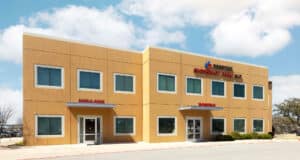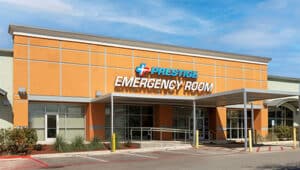San Antonio ER Services for Chest Pain Emergencies
Chest pain is a common symptom of heart attack and should never be taken lightly, especially when it’s persistent or recurrent. Prestige Emergency Room features state-of-the-art equipment aimed at diagnosing the cause of chest pain in San Antonio so patients can feel confident they’ll receive the most appropriate care and chest pain treatment.
Emergency Chest Pain Emergency Care Services in San Antonio
Chest pain can be caused by many issues, including traumatic injury to bones or soft tissues, infections like pleurisy or pneumonia, muscle strain, heartburn or gastroesophageal reflux disease (GERD), and lung- or heart-related problems. Heart attack and coronary artery disease also cause chest pain, and chest pain that recurs may be angina, a type of pain that occurs when oxygen flow to the heart is compromised. Because chest pain can be a sign of a serious underlying medical problem, including heart disease, being evaluated for any type of chest pain is critically important.
How is emergency chest pain treated?
Diagnosis begins with a review of symptoms and a physical exam to listen to the heart and lungs and sometimes evaluate the heart’s electrical activity. A comprehensive medical history also is important for identifying risk factors for heart-related issues including heart disease. Depending on the symptoms and risk factors, evaluations and tests including blood work, chest X-rays, ultrasounds or cardiac stress tests may be recommended. For San Antonio chest pain treatment, sometimes, a minimally-invasive procedure called catheterization will be used to evaluate the heart and arteries or to perform minor procedures to unblock arteries or regulate heart activity. Pain due to cardiac infection will require intensive use of chest pain treatment medicines, sometimes given by IV. When hypertension is present, medication and lifestyle changes can be used to keep blood pressure under control.
What causes angina?
Angina usually occurs in people who have atherosclerosis, a condition that occurs when sticky plaque builds up along walls of the coronary arteries, narrowing the lumen or interior diameter of the arteries so the heart doesn’t receive sufficient oxygen-rich blood. Less commonly, angina can occur in people with vasospasm, a condition that causes the arteries to contract or “spasm,” restricting the flow of blood. This type of angina is called Prinzmetal angina.
What symptoms do heart attacks cause?
Chest pain is a common symptom of heart attack, but other symptoms include:
- Pain in the back, shoulders, arms, belly or jaw
- Shortness of breath
- Pressure in the chest
- Extreme fatigue
- Shortness of breath
- Excessive sweating
- Dizziness, lightheadedness and fainting












